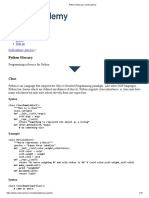0 ratings0% found this document useful (0 votes)
82 viewsPython Identifiers
In Python, an identifier is a name given to variables, functions, classes, and other entities to uniquely identify them. Identifiers can contain letters, numbers, and underscores, must start with a letter or underscore, and are case-sensitive. Keywords like if and else cannot be used as identifiers, and double underscore names have special meanings.
Uploaded by
vinayvbugadeCopyright
© © All Rights Reserved
Available Formats
Download as DOCX, PDF, TXT or read online on Scribd
0 ratings0% found this document useful (0 votes)
82 viewsPython Identifiers
In Python, an identifier is a name given to variables, functions, classes, and other entities to uniquely identify them. Identifiers can contain letters, numbers, and underscores, must start with a letter or underscore, and are case-sensitive. Keywords like if and else cannot be used as identifiers, and double underscore names have special meanings.
Uploaded by
vinayvbugadeCopyright
© © All Rights Reserved
Available Formats
Download as DOCX, PDF, TXT or read online on Scribd
You are on page 1/ 1
In Python, an identifier is a name given to entities like variables, functions, classes, modules, etc.
It
helps in uniquely identifying these entities in a program. Here are the rules for creating identifiers in
Python:
Allowed Characters:
It can include letters in lowercase (a to z) or uppercase (A to Z).
It can include digits (0 to 9).
It can include the underscore character (_).
Rules for Naming:
Identifiers should start with a letter (a-z, A-Z) or an underscore (_).
The subsequent characters can be letters, digits, or underscores.
Python is case-sensitive, so "myVar" and "myvar" are different identifiers.
Reserved Words:
Avoid using Python keywords as identifiers, as they have special meanings. For example, if, else,
while, for, class, def, import, etc.
Special Identifiers:
Identifiers starting and ending with double underscores (__) are reserved for special use in Python.
For example, __init__ is used as a special method in classes.
Convention:
It's a convention to use lowercase names for functions and variables, and uppercase names for
classes. If an identifier name consists of multiple words, it's common to use underscores to separate
them (snake_case).
You might also like
- Python Style Guide - How To Write Neat and Impressive Python CodeNo ratings yetPython Style Guide - How To Write Neat and Impressive Python Code14 pages
- Le1 Language Basics Ending - Jupyter NotebookNo ratings yetLe1 Language Basics Ending - Jupyter Notebook3 pages
- Indentation and Comments, Identifiers, Variables in Python - 1624381905177No ratings yetIndentation and Comments, Identifiers, Variables in Python - 16243819051778 pages
- 2.1 Python Identifiers and Reserved WordsNo ratings yet2.1 Python Identifiers and Reserved Words1 page
- Python Keywords, Identifiers and Variables - FundamentalsNo ratings yetPython Keywords, Identifiers and Variables - Fundamentals179 pages
- Unit 1 - Introduction To Python ProgrammingNo ratings yetUnit 1 - Introduction To Python Programming32 pages
- 3.classes: 3.1. Python Scopes and NamespacesNo ratings yet3.classes: 3.1. Python Scopes and Namespaces10 pages
- Unit-I Introduction and Syntax of Python ProgramNo ratings yetUnit-I Introduction and Syntax of Python Program16 pages



























































